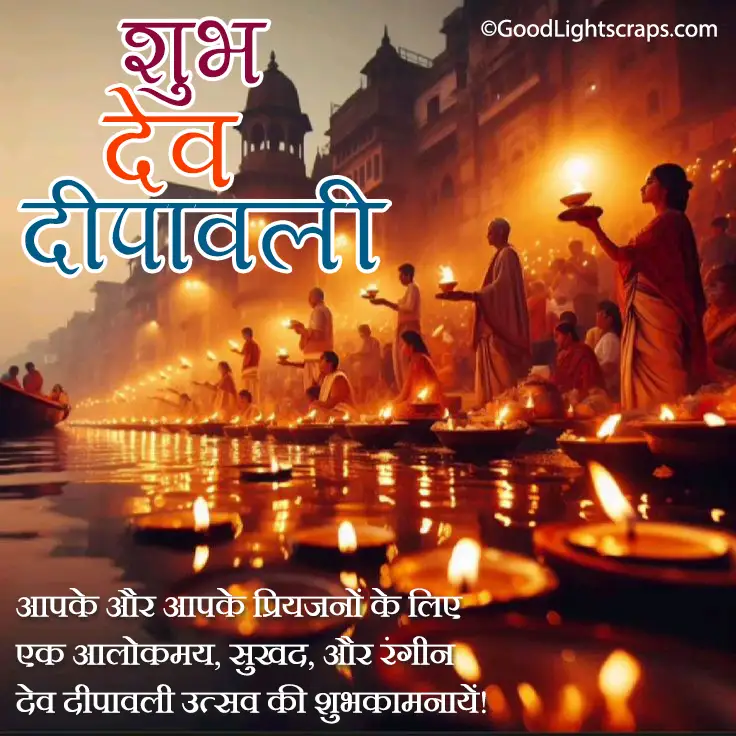Dev Deepavali, also known as the "Diwali of the Gods", is a sacred Hindu festival celebrated with devotion in Varanasi, India. It occurs on the full moon night of the Hindu month of Kartika (usually in November), fifteen days after Diwali, the festival of lights. This divine celebration symbolizes the descent of the gods and goddesses to Earth and honors the victory of Lord Shiva over the demon Tripurasura. Dev Deepavali is unique to the holy city of Varanasi and has become one of the most mesmerizing and spiritual festivals in India.

Images and sayings
The origin of Dev Deepavali is rooted in ancient Hindu mythology, especially stories involving Lord Shiva. According to legend, a powerful demon named Tripurasura was causing chaos across the three worlds. The gods ask for help from Lord Shiva, who agreed to slay the demon and restore peace. Lord Shiva successfully defeat Tripurasura on the day of Kartik Purnima. To mark this victory, the divine beings descended to the ghats of the Ganges River in Varanasi to celebrate with lights, lamps, and prayers. This occasion has since been celebrated annually as Dev Deepavali.
Another layer of significance is added as Dev Deepavali takes place on Kartik Purnima, a full-moon night considered highly auspicious in the Hindu calendar. This day is also dedicated to Lord Vishnu, who is believed to have incarnated as the Matsya (fish) avatar to save humanity and the Vedas. As such, Dev Deepavali is not only a celebration of Lord Shiva's victory but also a day to honor Lord Vishnu, making it a special time for devotees of both deities.
Celebrations Along the Ghats of the Ganges
In Varanasi, Dev Deepavali is celebrated in a spectacular manner that draws pilgrims and tourists from all over the world. The festival preparations begin days in advance, with people cleaning and decorating the ghats of River Ganges. On the night of Dev Deepavali, these ghats come alive with thousands of earthen lamps, called "diyas," illuminating the entire riverbank, create a stunning reflection on the waters of the Ganges, symbolizing the divine presence on Earth.
The major ghats, including Dashashwamedh, Assi, and Manikarnika, are decorated with beautiful rangoli and flowers. Devotees offer prayers, perform rituals, and light lamps, with the belief that doing so brings blessings from the gods. One of the most breathtaking aspects of the celebration is the Ganga Aarti (ritual of worshipping the Ganges), where priests, dressed in traditional attire, perform prayers with burning lamps, incense, and chanting of Vedic hymns. The air becomes thick with the fragrance of incense, adding to the surreal, otherworldly atmosphere.

Images and sayings
The day of Dev Deepavali is filled with religious rituals and offerings. Devotees rise early and bathe in the Ganges, an act believed to purify their souls and wash away sins. They then visit temples to offer prayers and participate in the special puja ceremonies conducted for Kartik Purnima. Alongside these rituals, many devotees engage in "Deepdaan" (lamp donation), where they float earthen lamps on the Ganges as an offering to the river goddess and to honor the ancestors.
Another important rituals observed during Dev Deepavali is the worship of Lord Vishnu and Lord Kartikeya (the son of Lord Shiva), as Kartik Purnima is also considered sacred for these deities. Pilgrims participate in chanting, bhajans (devotional songs), and kirtans (musical prayers) throughout the day and night.
The Cultural and Social Impact
Beyond its religious importance, Dev Deepavali has become a cultural event that promotes community bonding and a sense of belonging among people. The entire city of Varanasi joins hands to make this festival a success, with families, friends, and even strangers coming together to celebrate and offer prayers. The event attracts a vast number of pilgrims, artists, photographers, and tourists, adding to the cultural richness and diversity of the city. It has also become an important time for people from around the world to experience Indian spirituality, traditions, and the enchanting beauty of Varanasi.
Dev Deepavali in Modern Times
With its ever-growing popularity, Dev Deepavali has become a landmark festival on the Indian cultural calendar. Over time, the event has incorporated elements of modern celebration, with laser light shows, fireworks, and even boat rides for tourists to witness the illuminated ghats from the river itself. The traditional celebrations have been preserved, but the festival now also serves as a major attraction for the tourism industry, bringing economic benefits to the region.
In recent years, awareness about preserving the sacred Ganges has also been emphasized during Dev Deepavali, as devotees and tourists alike are encouraged to respect and maintain the cleanliness of the river.
Conclusion
Dev Deepavali is more than a festival—it is a spiritual experience that connects people with the divine, celebrates the triumph of light over darkness, and brings an ancient city to life in a remarkable way. It serves as a reminder of the rich cultural heritage of India, the profound depth of Hindu mythology, and the unbreakable bond between humanity and the divine. For anyone who experiences it, Dev Deepavali in Varanasi is a memory to be cherished, embodying peace, devotion, and the transcendent beauty of life along the sacred Ganges.

No comments:
Post a Comment